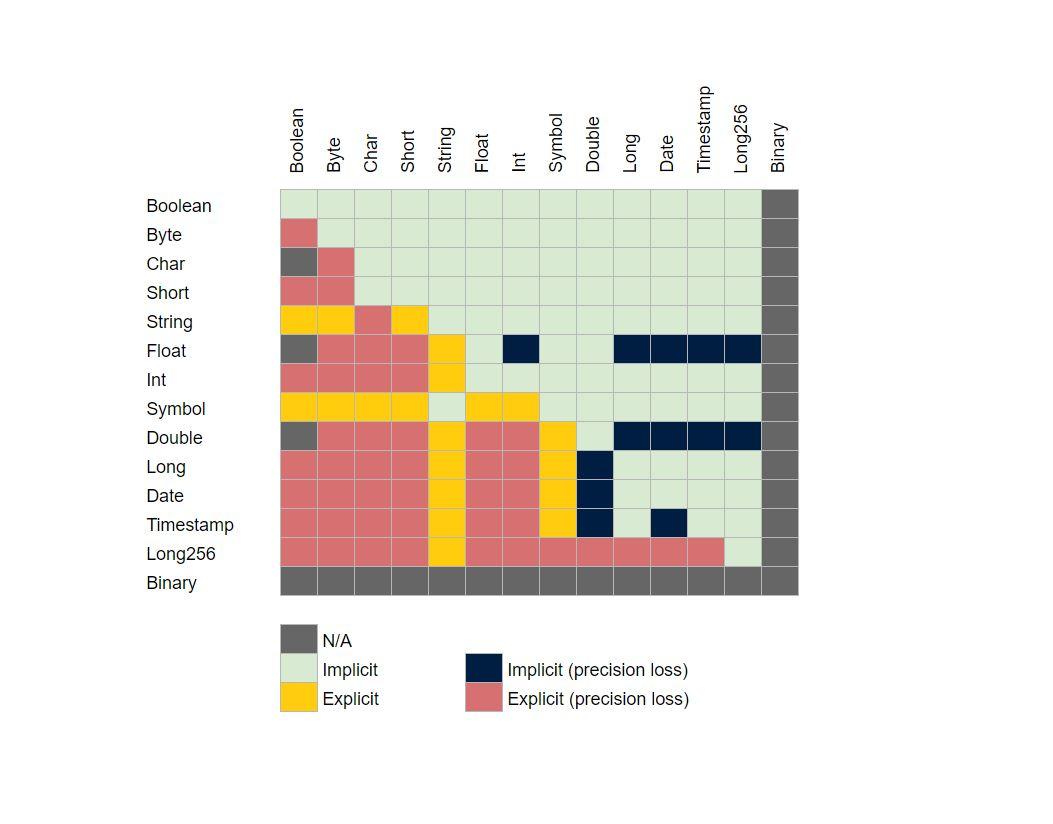CAST keyword
Type conversion. Can be either:
- Explicit via
cast() - Implicit, in which case it will be automatically performed when required by the context.
Syntax
where:
expressioncan be a constant, a column, or an expression that evaluates to a value.typerefers to the desired data type.
cast can be used a part of arithmetic expression as normal
Explicit conversion
Types can be converted from one to another using the cast() function.
Examples
SELECT
cast(3L + 2L AS INT),
cast(1578506142000000 AS TIMESTAMP),
cast('10.2' AS DOUBLE),
cast('行' AS INT);
| cast | cast1 | cast2 | cast3 |
|---|---|---|---|
| 5 | 2020-01-08T17:55:42.000000Z | 10.2 | 34892 |
Explicit casting of an expression to a smaller data type may result in loss of data when the output data type is smaller than the expression.
- Casting a decimal number type (
floatordouble) to an integer number type (long,int,short) will result in decimals drop. - If the integer part being cast is larger than the resulting data type, it will be resized by truncating bits.
- Conversions from
charto a number type will return the correspondingunicodenumber and vice versa.
Precision loss examples
SELECT
cast(3.5 + 2 AS INT),
cast(7234623 AS SHORT),
cast(2334444.323 AS SHORT);
| cast | cast1 | cast2 |
|---|---|---|
| 5 | 25663 | -24852 |
When casting numbers into a smaller data type, QuestDB will truncate the higher bits of this number.
Implicit conversion
Type casting may be necessary in certain context such as
- Operations involving various different types
- Inserting values where the originating type is different from the destination column type.
QuestDB will attempt to convert to the data type required by the context. This
is called implicit cast and does not require using the cast() function.
Implicit casts are only performed when they would NOT:
- Reduce overall precision
- Truncate potential results
Implicit casting also prevents data loss.
When an operation involves multiple types, the resulting type will be the smallest possible type so that no data is lost.
The below chart illustrates the explicit and implicit cast available in QuestDB:

SELECT
1234L + 567,
1234L + 0.567,
to_timestamp('2019-10-17T00:00:00', 'yyyy-MM-ddTHH:mm:ss') + 323,
to_timestamp('2019-10-17T00:00:00', 'yyyy-MM-ddTHH:mm:ss') + 0.323;
| column | column1 | column2 | column3 |
|---|---|---|---|
| 1801 | 1234.567 | 2019-10-17T00:00:00.000323Z | 1571270400000000 |
Alternate syntax
There is a shorthand cast syntax.
Using the above example:
SELECT
cast(3.5 + 2 AS INT),
cast(7234623 AS SHORT),
cast(2334444.323 AS SHORT);
We can use the :: syntax to shorten things up:
SELECT
(3.5 + 2)::INT,
7234623::SHORT,
2334444.323::SHORT;
Which to choose?
It's all preference, however many consider the short hand to be more readable.